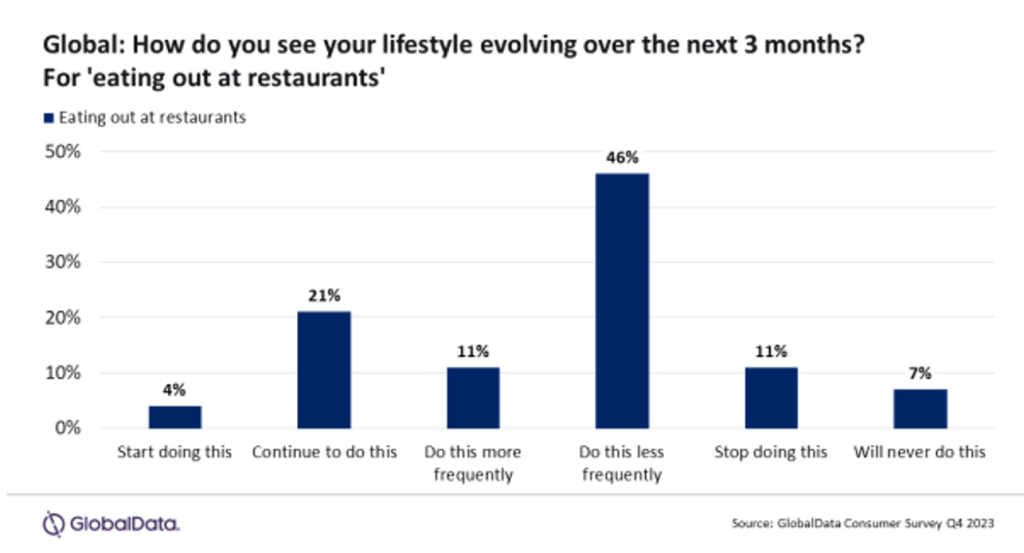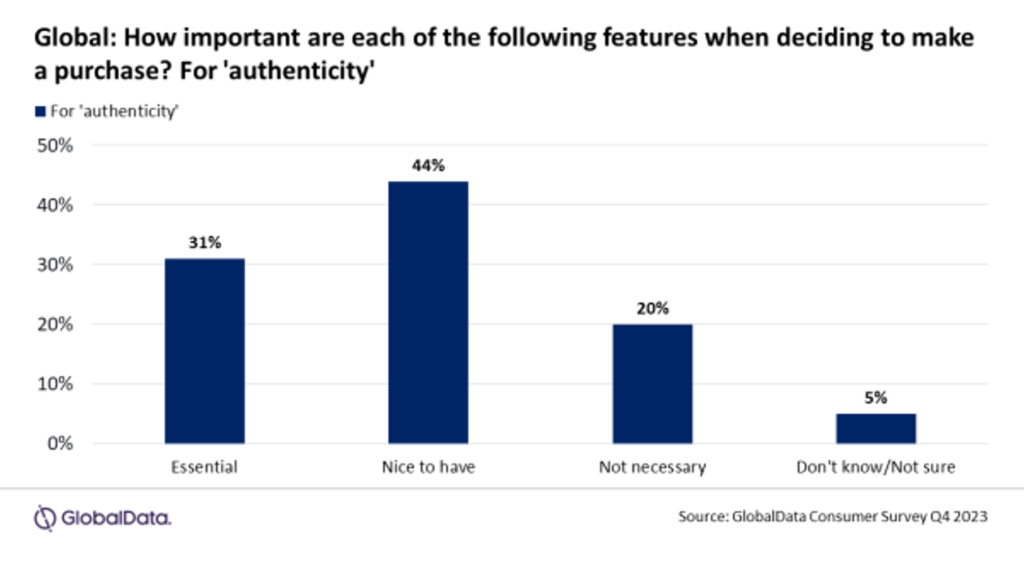A new type of consumer has emerged from the post-pandemic recovery. Referred to as the “hermit consumer”, they are staying in more and going out less with continued implications for foodservice.
As we begin 2024, there are several reasons to believe that, generally speaking, economic conditions will become more favourable. Global inflation is set to continue falling, and the supply-chain issues left over from the pandemic years are being resolved. However, it is becoming ever more apparent that many foodservice channels are not on the path to “recovery” in the way many expected during the initial tumult of the pandemic.
According to leading data and analytics company GlobalData, the global foodservice industry has not returned to any kind of pre-pandemic normalcy during 2023. Value sales have increased just 3% since 2019 with overall transactions down 3% over the same period. Revenue from dine-in sales is down 12% compared to 2019, while revenue from takeaways is up 46%.
Fred Diamond, senior food consultant consumer custom solutions at GlobalData, comments: “The idea of a post-pandemic recovery for the foodservice industry assumes that 2020-21 was a blip – an exogenous, once-in-a-lifetime event which would halt progress for a year or two before normal trends and consumer behaviour resumed. However, during that period something changed. We have changed. People are still spending, and still consuming, but in a radically different way. This new type of consumer has been termed the “hermit consumer,” giving rise to the “hermit economy”.
Behavioural change on a global scale
The hermit economy overlaps with concepts such as “cocooning”, a word used to describe the phenomenon of people staying in more and focusing on improving the comfort and convenience of their homes at the expense of outdoor experiences. Examples would include someone foregoing eating out and instead using the savings over time to improve their kitchen, or substituting a supermarket “fake-away” meal kit for an actual takeaway. Such concepts also overlap with the effects of inflation on consumer behaviour.
Globally, 46% of consumers stated they will be eating out less frequently over the next three months, and a further 11% stated they will stop altogether, according to GlobalData’s Q4 2023 consumer survey.

Diamond comments: “So, in 2020-21, people stayed in more because of the coronavirus. In 2022-23 people stayed in more because of price rises. This is four years of behavioural change on a global scale. The idea things could snap back to the way people saw the future from the vantage point of 2019 has to be abandoned, and the new landscape embraced.”
Impact of the “hermit economy” on key regions
In Western Europe alone, foodservice transactions are down 9% for dine-in meals and up 23% for takeaways in 2023 compared to 2019, while overall transactions are down 3%. Similar trends are seen in Asia and North America.
Diamond continues: “In a way, this is no surprise. The major beneficiaries of lockdowns, such as delivery platforms, have of course aimed to maintain their new-found dominance. The rise in “ghost kitchens”, which are delivery-only foodservice outlets, has also served to cement this new landscape. But this is not simply an equal shift from dine-in to takeaway. In many regions, such as Asia and Europe, foodservice markets are down on 2019 levels.”
This is a combination of both a mass exodus from one channel to another and a general loss of interest in the sector. This drop in interest could be attributed in part to the rise of the “hermit economy”.
The role of authenticity and heritage
Product innovation should always be considered when facing the dual challenges of falling footfall and reduced spending. Limiting the time when new menu items or offers are available can create artificial scarcity and prompt consumers to get out and spend while the product that caught their interest is still available. In the process, consumers will be susceptible to further influences from the brand, which could help to build customer loyalty.
Appealing to concepts such as authenticity and heritage can also resonate strongly with consumers. Consumers all over the world are becoming skeptical of products that appear “mass-produced” or otherwise unoriginal. Outlets also need to lean into their ties to the community they serve. This can be achieved through sourcing ingredients locally, reflecting local culture in the food served, or manufacturing some part of the food nearby.

75% of global consumers say that authenticity is “essential” or “nice to have” when deciding which product to purchase, according to GlobalData’s Q4 2023 consumer survey.
Finally, operators without a takeaway or delivery option need to introduce one. One way of doing so is to join a third-party delivery app. The cut they take would have to be either absorbed by the business or passed on to the consumer, which is not always desirable. However, the price of having no visibility online can be much greater.
Diamond adds: “Before attempting to cut prices even further, operators need to keep in mind that consumers already have the ability to choose cheaper food options; this is why concepts like “fakeaways” exist. Indeed, actual takeaways have historically been cheaper than a dine-in experience. Therefore, to entice the hermit consumer back into their outlets operators should focus on conveying that they have good portion sizes, while also highlighting the best ingredients they have to offer, contrasting them with what consumers might find in cheaper alternatives.”
GlobalData Consumer Custom Solutions offers sector-level expertise in the Beverages, Food, Retail, Packaging and Agri industries. We use our unique data, expert insights and analytics to answer your bespoke questions with a tailored approach and deliverables to meet your budget, timeline, and specific scenario. To learn more or have a chat, just drop us an email at consulting@globaldata.com or contact us here, and we’ll get in touch!





